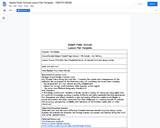
Students will research and debate the presidential terms of Gerald Ford and Jimmy Carter.
- Subject:
- American History
- Social Studies
- Material Type:
- Lesson
- Provider:
- Michigan Virtual
- Author:
- Tim Beebe
- Date Added:
- 04/26/2017

Students will research and debate the presidential terms of Gerald Ford and Jimmy Carter.

This lesson and resource helps students strengthen their persuasive writing by identifying and responding to counterarguments.
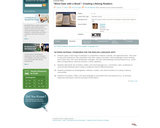
This extended lesson offers students a unique way to explore new books and think about the education process. They first participate in a "blind date" with a book - a quick reading of one small part of a novel - after which they are asked to rate it. Eventually, students choose a book to read and go on to debate whether their book should be added to the curriculum.

This resource provides facts, arguments, photos, video footage, etc. about the pros and cons of the Cuba Embargo; useful for teacher planning or student-friendly enough to use as a source for research.

The 11th grade learning experience consists of 7 mostly month-long units aligned to the Common Core State Standards, with available course material for teachers and students easily accessible online. Over the course of the year there is a steady progression in text complexity levels, sophistication of writing tasks, speaking and listening activities, and increased opportunities for independent and collaborative work. Rubrics and student models accompany many writing assignments.Throughout the 11th grade year, in addition to the Common Read texts that the whole class reads together, students each select an Independent Reading book and engage with peers in group Book Talks. Students move from learning the class rituals and routines and genre features of argument writing in Unit 11.1 to learning about narrative and informational genres in Unit 11.2: The American Short Story. Teacher resources provide additional materials to support each unit.

In this short unit, students will spend three lessons exploring the importance of themes and main ideas in fiction and informational texts. Now would be a good time to have them take an assessment of their reading and writing skills. They'll explore theme through O. Henry's classic short story "The Gift of the Magi" and consider how this piece compares to the main idea in the article "The Proven Power of Giving, Not Getting."

In this lesson, you will take the writing portion of the culminating assessment. You will continue to use the skills you have learned in the first three lessons of this unit.Today, students will take the writing portion of the culminating assessment.They will reflect on all the material they have read in this unit, and they will use their understanding of all the material presented to them to write an essay. You will evaluate their work in both reading comprehension and writing.Lesson PreparationRead the lesson and student content.Anticipate student difficulties and identify the differentiation options you will choose for working with your students.If you have students on an IEP or other accommodations, check to see whether they receive extended time or need an alternative test setting. Work with the professional supporting SWDs to make sure student needs are met.
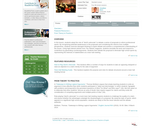
In this multi-day lesson, students will play the role of "devil's advocate" in debating the potential reform of professional sports. Students will consider multiple perspectives as they annotate texts in preparation for a culminating debate activity in which they assume roles of several hypothetical stakeholders.
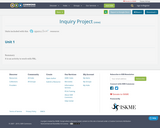
It is an activity to work with PBL.
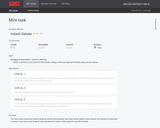
The class will be divided into teams (randomly chosen and assigned). Each team will be asked to either defend the premise of a piece text or refute it. Each team must create an opening statement-make a verbal argument and offer rebuttal.

This packet contains a curriculum-embedded CCLS?aligned task and instructional supports. The task is the culminating task at the end of a 3?5 week unit. Throughout their 9th grade year, students read informational and literary texts focused on responding to the essential question of ?Who am I?? In the study of this question, students will draw from a variety of sources, including texts addressing the social, political, economic, and cultural factors and relationships that build identity in order to analyze the place which rites of passage have in the 21st century.
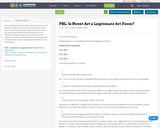
An investigation into the difference between street art / graffiti / vandalism, the reason people execute these types of unsanctioned markings, and whether or not the viewpoints and the markings themselves are legitimate forms of expression. Students will also propose solutions to dealing with unsanctioned public marking based on their standpoint of whether or not it is legitimate.
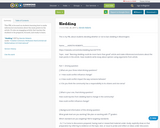
This PBL is focused on students learning how to make inferences/conclusions about the main points in the article. It's also an engaging activity that teaches the students to be prepared, focused, and ready to learn.
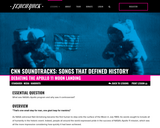
Students will watch clips from CNN's Soundtracks to identify historic details of NASA's Apollo program. Students will then identify poet and musician Gil Scott-Heron's critical view of the Apollo program through his song, "Whitey On The Moon" and participate in a structured academic controversy activity to debate the controversy of the program.

In this lesson, students examine the state of the print newspaper industry, then debate its future.
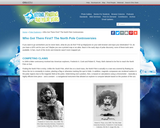
This article discusses the controversies surrounding North Pole exploration that began in the early 1900s and continue to be debated today.